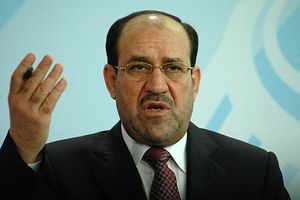China’s special envoy to Middle East, Wu Sike, visited Iraq this week as part of a wider tour of the Middle East. Chinese Foreign Ministry spokesperson Hong Lei told reporters that Wu met with Iraq’s prime minister, Nouri al-Maliki, as well as Deputy Prime Minister Saleh al-Mutlaw and Foreign Minister Hoshyar Zebari.
According to Hong, Wu carried a message of support for “Iraq’s efforts in safeguarding national sovereignty, independence and combating terrorism.” Wu promised to continue China’s “political, moral and material support” for Maliki’s government, even while urging Iraq to “offer more effective protection to Chinese enterprises and personnel in Iraq.” There are over 10,000 Chinese workers in Iraq, some of whom have already been evacuated from conflict zones. Most of China’s workers, however, are located in the south of Iraq, far from most of the fighting.
According to People’s Daily, Maliki expressed his appreciation for China’s support for Iraq. He also assured Wu that the Iraqi government would ensure the safety of Chinese workers as well as the financial investments of Chinese companies.
Maliki is in search of any support he can find, as the U.S. government has been signaling that it would like to see a new government in place. According to the Wall Street Journal, the Obama administration feels Maliki cannot form an inclusive government that will allow Baghdad to regain control of Sunni-dominated areas. But Beijing’s expression of support for Iraqi sovereignty does not necessarily translate into full support for Maliki. While in Iraq, Wu expressed China’s hope that Iraq can “form as quickly as possible a new government that highlights inclusiveness, and can represent all political powers in the country.”
Though China has taken a passive role in the Iraq crisis, as per its diplomatic policies of non-interference, that should not be taken to mean a lack of concern. As Wu put it, “The stability of Iraq is key to [the] peace and stability of the entire Middle East, as well as that of the world.” China’s energy needs alone ensure that any crisis in the oil-rich region will be watched closely by Beijing. Added to this, China has larger plans for the region: Xi’s ambitious Silk Road Economic Belt must necessarily pass through the Middle East, including Iraq, to reach Europe.
As a demonstration of China’s concern, Wu Sike’s trip this week is dominated by the Iraq issue. After leaving Baghdad, Wu planned to to Turkey and Iran to discuss the on-going crisis in Iraq with those regional powers. China has also called for increased international support for Maliki’s government, indicating a desire for more global cooperation on the issue.
































